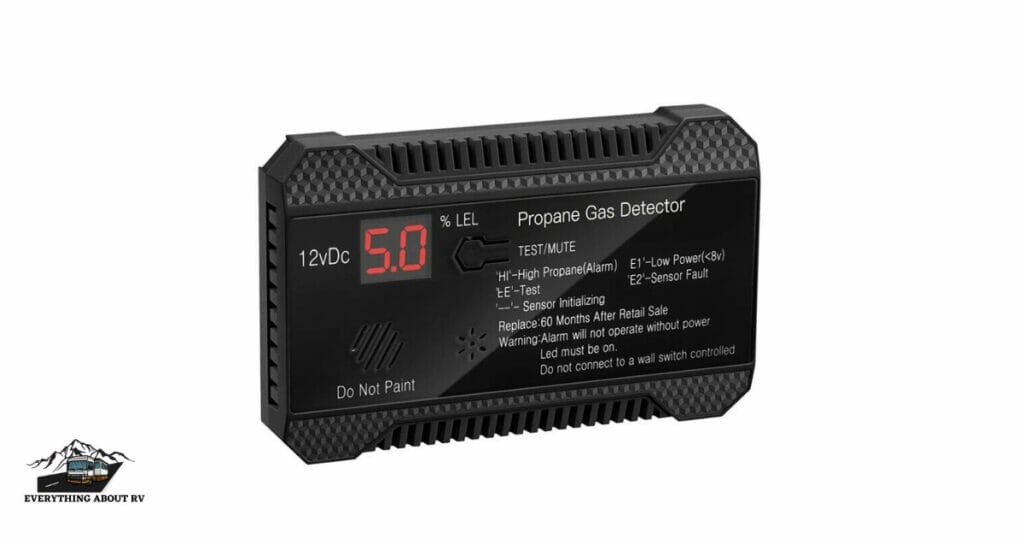Introduction
RVs (Recreational Vehicles) offer a mobile and comfortable mode of transportation and exploration. They are, however, susceptible to pests such as insects, just like any other living space. To combat these unwanted visitors, some RV owners use bug bombs, also known as foggers. These products spray insecticides into the air, covering a large area within the RV. However, there are concerns about the potential interaction between bug bombs and RV propane alarms. In this article, we’ll look at whether bug bombs can set off an RV propane alarm and discuss the critical factors to think about.
I. Understanding RV Propane Alarms
Before delving into the connection between bug bombs and RV propane alarms, it’s essential to understand what these alarms are and what they’re for. RV propane alarms are safety devices that detect the presence of propane gas in recreational vehicles. Propane gas is widely used in RVs for cooking, heating, and powering appliances. The alarm detects propane leaks in the air and alerts occupants if the gas concentration reaches a dangerous level.
II. How Bug Bombs Work
Bug bombs combat pests by dispersing an insecticide mist into the air. They are typically pressurized cans that contain a liquid insecticide formulation. When the canister is activated, the insecticide is released as a fog or mist that fills the targeted area. The fog can enter various nooks and crannies within the RV, effectively reaching insect hiding places.
III. Propane Alarm Sensitivity
RV propane alarms are built to be extremely sensitive, detecting even trace amounts of propane gas. Because of this sensitivity, potential propane leaks are detected quickly, preventing any safety hazards. The alarms are set to sound when the propane concentration in the air reaches a certain level.
IV. Factors Affecting Propane Alarm Activation
Several factors can set off an RV propane alarm, and it is critical to be aware of them in order to avoid false alarms. Alarm activation can be caused by a variety of factors, including propane leaks, low battery voltage, and sensor malfunctions. It is critical to maintain the propane system, ensuring that there are no leaks and that the alarm’s sensors are in good working order.
V. Can Bug Bombs Set Off RV Propane Alarms?
The question is whether or not bug bombs can set off an RV propane alarm. The answer is dependent on a number of factors, including the alarm’s sensitivity and the concentration of insecticide released by the bug bomb. When used correctly, bug bombs are unlikely to set off an RV propane alarm. The amount of insecticide required to set off the alarm is typically greater than that released by bug bombs. To minimize any potential risks, it is critical to exercise caution and follow safety guidelines.
VI. Propane Alarm Placement
Proper placement of the RV propane alarm is critical for effective leak detection and prevention. The alarm should be placed in a location where propane gas is likely to accumulate, such as near the floor or near gas appliances. Making sure the alarm is properly positioned can help to reduce the number of false alarms caused by bug bombs or other factors.
VI. Safety Precautions
It is critical to prioritize safety when using bug bombs in an RV to protect yourself and the vehicle. Before deploying bug bombs, ensure that all propane appliances and the propane system are turned off. Remove any open flames or ignition sources from the RV. Evacuate the vehicle and follow the instructions that came with the bug bomb. After the recommended waiting time, thoroughly ventilate the RV before re-entering.
VII. Alternatives to Bug Bombs
While bug bombs can be effective for pest control, some RV owners may prefer non-insecticide pest control methods. To deter pests in an RV, natural alternatives such as essential oils, diatomaceous earth, or traps can be used. Furthermore, practicing good hygiene and cleanliness habits, sealing entry points, and removing attractants can help prevent infestations from occurring in the first place.
Conclusion
In conclusion, bug bombs are generally unlikely to set off an RV propane alarm if used correctly. RV propane alarms are highly sensitive but require a specific concentration of propane gas to trigger an alert. However, it is crucial to exercise caution, follow safety precautions, and ensure proper placement of the propane alarm. Prioritizing safety and considering alternative pest control methods can help maintain a pest-free and safe RVing experience.
FAQs
1. Can bug bombs cause a propane leak in an RV?
Ans: Bug bombs, when used properly, are unlikely to cause a propane leak in an RV. However, it is crucial to follow safety guidelines and ensure the propane system is turned off before deploying bug bombs.
2. Are there any specific bug bombs recommended for use in RVs?
Ans: There are bug bombs specifically formulated for use in RVs. These products are designed to effectively control pests while considering the limited space within recreational vehicles. It’s advisable to choose bug bombs suitable for RV use.
3. Can I temporarily disable my RV propane alarm when using bug bombs?
Ans: It is not recommended to disable your RV propane alarm temporarily. Propane alarms are crucial safety devices, and disabling them can put you at risk. Instead, follow the safety precautions mentioned earlier to ensure a safe environment when using bug bombs.
4. What should I do if my RV propane alarm goes off after using bug bombs?
Ans: If your RV propane alarm goes off after using bug bombs, immediately evacuate the vehicle. Ventilate the RV by opening windows and doors to allow fresh air in. Contact a professional to inspect your propane system and ensure there are no leaks or other issues.
5. Are there natural alternatives to bug bombs for RV pest control?
Ans: Yes, there are natural alternatives to bug bombs for RV pest control. Essential oils, diatomaceous earth, and traps can be used to deter pests in an environmentally friendly manner. Additionally, practicing good hygiene habits and sealing entry points can help prevent infestations.



